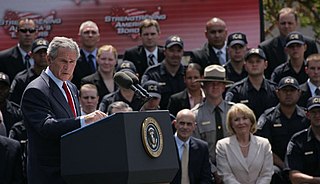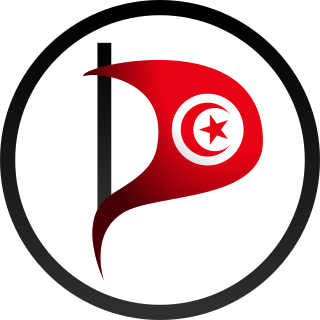Decentralization or decentralisation is the process by which the activities of an organization, particularly those regarding planning and decision-making, are distributed or delegated away from a central, authoritative location or group and given to smaller factions within it.

Secrecy is the practice of hiding information from certain individuals or groups who do not have the "need to know", perhaps while sharing it with other individuals. That which is kept hidden is known as the secret.

Surveillance is the monitoring of behavior, many activities, or information for the purpose of information gathering, influencing, managing or directing. This can include observation from a distance by means of electronic equipment, such as closed-circuit television (CCTV), or interception of electronically transmitted information like Internet traffic. It can also include simple technical methods, such as human intelligence gathering and postal interception.
E-government is the use of technological communications devices, such as computers and the Internet, to provide public services to citizens and other persons in a country or region. E-government offers new opportunities for more direct and convenient citizen access to government and for government provision of services directly to citizens.

The Telugu Desam Party is an Indian regional political party with great influence in the states of Andhra Pradesh and Telangana. It was founded by the former chief minister of Andhra Pradesh N. T. Rama Rao (N.T.R.) on 29 March 1982 and has focused on supporting Telugu speakers. The party has won a five-time majority in the Andhra Pradesh Legislative Assembly and has emerged as the most successful political outfit in the state's history. It is currently the main opposition party in the Andhra Pradesh Legislative Assembly.

E-democracy, also known as digital democracy or Internet democracy, is the use of information and communication technology (ICT) in political and governance processes. The term is believed to have been coined by digital activist Steven Clift. E-democracy incorporates 21st-century information and communications technology to promote democracy; such technologies include civic technology and government technology. It is a form of government in which all adult citizens are presumed to be eligible to participate equally in the proposal, development and creation of laws.
Technocracy is a form of government in which the decision-makers are selected based on their expertise in a given area of responsibility, particularly with regard to scientific or technical knowledge. This system explicitly contrasts with representative democracy, the notion that elected representatives should be the primary decision-makers in government, though it does not necessarily imply eliminating elected representatives. Decision-makers are selected based on specialized knowledge and performance rather than political affiliations, parliamentary skills, or popularity.
The Association for Information Science and Technology (ASIS&T) is a nonprofit membership organization for information professionals that sponsors an annual conference as well as several serial publications, including the Journal of the Association for Information Science and Technology (JASIST). The organization provides administration and communications support for its various divisions, known as special-interest groups or SIGs; provides administration for geographically defined chapters; connects job seekers with potential employers; and provides organizational support for continuing education programs for information professionals.

National Journal is an advisory services company based in Washington, D.C., offering services in government affairs, advocacy communications, stakeholder mapping, and policy brands research for government and business leaders. It publishes daily journalism covering politics and public policy and is led by president Kevin Turpin, National Journal Daily editor-in-chief Jeff Dufour, and The Hotline editor-in-chief Kirk Bado.

Civic engagement or civic participation is any individual or group activity addressing issues of public concern. Civic engagement includes communities working together or individuals working alone in both political and non-political actions to protect public values or make a change in a community. The goal of civic engagement is to address public concerns and promote the quality of the community.
Electronic governance or e-governance is the application of information technology for delivering government services, exchange of information, communication transactions, integration of various stand-alone systems between government to citizen (G2C), government-to-business (G2B), government-to-government (G2G), government-to-employees (G2E) as well as back-office processes and interactions within the entire governance framework. Through e-governance, government services are made available to citizens through IT. The three main target groups that can be distinguished in governance concepts are government, citizens, and businesses/interest groups.
Electronic participation (e-participation) is ICT-supported participation in processes involving government and citizens. Processes may concern administration, service delivery, decision making and policy making. E-participation is hence closely related to e-government and e-governance participation. The need for the term has emerged as citizen interests and interaction with political service providers have increasingly become digitized due to the rise of e-government.
Open government is the governing doctrine which maintains that citizens have the right to access the documents and proceedings of the government to allow for effective public oversight. In its broadest construction, it opposes reason of state and other considerations which have tended to legitimize extensive state secrecy. The origins of open-government arguments can be dated to the time of the European Age of Enlightenment, when philosophers debated the proper construction of a then nascent democratic society. It is also increasingly being associated with the concept of democratic reform. The United Nations Sustainable Development Goal 16 for example advocates for public access to information as a criterion for ensuring accountable and inclusive institutions.

Political communication is a subfield of communication and political science that is concerned with how information spreads and influences politics, policy makers, the news media, and citizens. Since the advent of the World Wide Web, the amount of data to analyze has exploded and researchers are shifting to computational methods to study the dynamics of political communication. In recent years, machine learning, natural language processing, and network analysis have become key tools in the subfield. It deals with the production, dissemination, procession and effects of information, both through mass media and interpersonally, within a political context. This includes the study of the media, the analysis of speeches by politicians, those that are trying to influence the political process, and the formal and informal conversations among members of the public, among other aspects. The media acts as a bridge between government and public. Political communication can be defined as the connection concerning politics and citizens and the interaction modes that connect these groups to each other. Whether the relationship is formed by the modes of persuasion, Pathos, Ethos or Logos.

Vivek Kundra is a former American administrator who served as the first chief information officer of the United States from March, 2009 to August, 2011 under President Barack Obama. He is currently the chief operating officer at Sprinklr, a provider of enterprise customer experience management software based in NYC. He was previously a visiting Fellow at Harvard University.

Tumkur University was established in 2004 in Tumkuru, Karnataka, India. It was carved out of Bangalore University to accommodate the needs of the students from Tumkuru district. Established under the Karnataka State Universities Act, 2000, as a multi-faculty university, it has 12 postgraduate departments, 2 constituent colleges and 94 affiliated colleges. It established 29 research centres to promote advanced multi-disciplinary research and academic collaborations. In 2012, the university was recognized under section 12(b) of the UGC Act, 1956. In the same year, the National Assessment and Accreditation Council (NAAC), an inter-university council of the UGC, accredited the university with "B" Grade in the three-grade rating scale.
The State Institute of Encyclopaedic Publications (SIEP) is a cultural institution founded in 1961 under the Department of Cultural Affairs, Government of Kerala, India with the objective of disseminating knowledge to the people of Kerala in their pursuit of learning. It was constituted as part of the government policy that Malayalam should be used as the medium of education, administration and judiciary.
The Institute of Governmental Studies (IGS) is an interdisciplinary organized research unit at UC Berkeley, located in Moses Hall. It was founded in 1919 as the Bureau of Public Administration. IGS and its affiliated centers spearhead and promote research, programs, seminars and colloquia, training, educational activities and public service in the fields of politics and public policy, with a strong focus on national and California politics. Current IGS research focuses include institutional policy and design, political reform, term limits, campaign finance, redistricting, direct democracy, presidential and gubernatorial politics, representative government, the politics of race and ethnicity, immigration and globalization.

Technology society and life or technology and culture refers to the inter-dependency, co-dependence, co-influence, and co-production of technology and society upon one another. Evidence for this synergy has been found since humanity first started using simple tools. The inter-relationship has continued as modern technologies such as the printing press and computers have helped shape society. The first scientific approach to this relationship occurred with the development of tektology, the "science of organization", in early twentieth century Imperial Russia. In modern academia, the interdisciplinary study of the mutual impacts of science, technology, and society, is called science and technology studies.

The Pirate Party is a small political party in Tunisia which was formed on 7 April 2012. It is the second Pirate party in Tunisia after the Tunisian Pirate Party.










